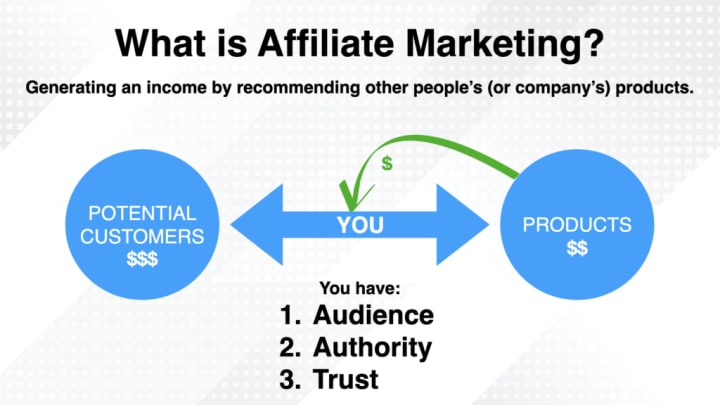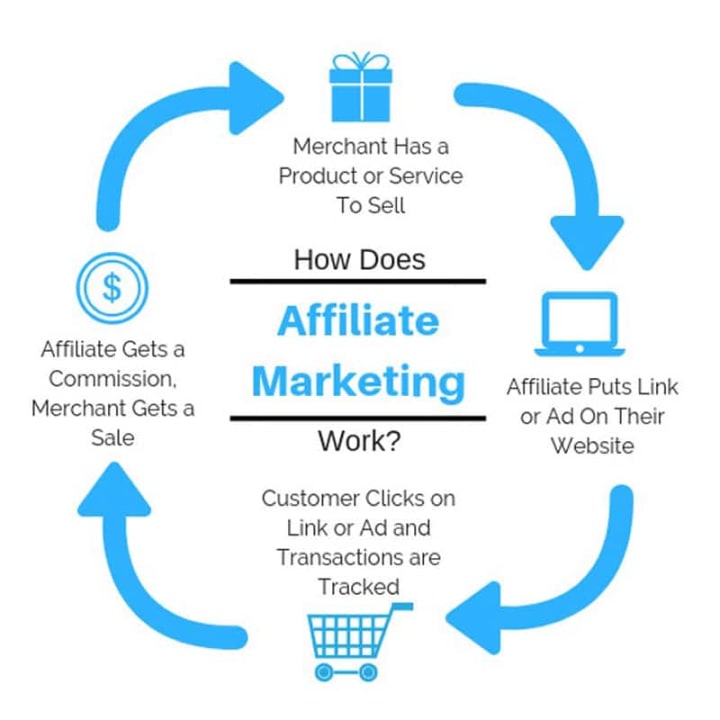Affiliate Marketing
My view of affiliate

Affiliate marketing is a type of online marketing where a company rewards an affiliate for each visitor or customer brought about by the affiliate's marketing efforts. In other words, the affiliate promotes the company's products or services and earns a commission on any resulting sales.
The process works as follows: the affiliate joins an affiliate program, receives a unique affiliate link, and then promotes that link to their audience through various marketing channels such as social media, email marketing, and content marketing. When a user clicks on the affiliate's link and makes a purchase, the affiliate earns a commission on the sale.
Affiliate marketing is beneficial for both the company and the affiliate. The company can reach a wider audience and increase sales without having to invest heavily in marketing efforts, while the affiliate can earn passive income by promoting products or services that they believe in.

There are various types of affiliate marketing programs, including pay-per-click, pay-per-lead, and pay-per-sale. Pay-per-click programs pay affiliates for each click on their affiliate link, while pay-per-lead programs pay affiliates for each lead or signup they generate. Pay-per-sale programs pay affiliates a commission for each sale that results from their promotion.
Overall, affiliate marketing is a popular and effective way for companies to reach new customers and for affiliates to earn income by promoting products or services that they support.
Affiliate marketing has become increasingly popular in recent years, with many companies offering affiliate programs to their customers, fans, and followers. The growth of social media and content marketing has also made it easier for affiliates to promote products and services to their audience.
One of the benefits of affiliate marketing for companies is that they only pay for results. This means that they don't have to invest in expensive advertising campaigns unless they see a return on investment. Additionally, affiliates can help to increase brand awareness and drive traffic to a company's website, which can result in increased sales and revenue.
For affiliates, affiliate marketing can be a lucrative source of income, especially if they have a large and engaged audience. However, it's important to note that not all affiliate programs are created equal. Some programs offer higher commissions than others, and some may have strict requirements for participation.
It's also important for affiliates to disclose their relationship with the company they are promoting. This is required by law in many countries, and failure to disclose this information can result in fines and legal action.
Overall, affiliate marketing is a win-win for both companies and affiliates. It allows companies to increase sales and reach new customers, while providing affiliates with an opportunity to earn income by promoting products and services they believe in. With the growth of e-commerce and online marketing, affiliate marketing is likely to continue to grow in popularity in the years to come.
There are several advantages to affiliate marketing that make it an attractive option for companies and affiliates alike. One of the main benefits is that it is a relatively low-cost marketing strategy. Companies do not have to invest in expensive advertising campaigns or pay for clicks or impressions that do not result in sales. Instead, they only pay commissions on actual sales generated by affiliates.
Affiliate marketing also allows companies to leverage the reach and influence of affiliates. Affiliates often have large and engaged audiences, which can help to increase brand awareness and drive traffic to a company's website. This can be especially beneficial for companies that are just starting out or that have limited marketing budgets.
For affiliates, the benefits of affiliate marketing include the ability to earn passive income by promoting products or services that they believe in. Affiliates can also choose which products or services to promote, giving them the flexibility to focus on products that are relevant to their audience and that align with their values and interests.
One of the challenges of affiliate marketing is that it can be difficult to stand out in a crowded marketplace. With so many affiliates promoting similar products and services, it can be challenging to differentiate oneself and attract clicks and sales. To be successful in affiliate marketing, it's important to build a strong brand and establish a loyal following that trusts and values one's recommendations.
In conclusion, affiliate marketing is a powerful marketing strategy that can help companies to increase sales and reach new customers, while providing affiliates with an opportunity to earn income by promoting products and services they believe in. With the growth of e-commerce and online marketing, affiliate marketing is likely to continue to be an important and effective way for companies to grow their businesses and for affiliates to monetize their online presence.

To be successful in affiliate marketing, both companies and affiliates need to have a clear strategy and understand their target audience. Companies should carefully select affiliates who have a relevant audience and can effectively promote their products or services. They should also provide affiliates with the necessary resources, such as marketing materials, product information, and customer support, to ensure that they can effectively promote and sell their products.
Affiliates, on the other hand, should focus on building trust with their audience and providing value through their content and recommendations. This can be achieved by creating high-quality content, engaging with their audience, and being transparent about their relationship with the companies they promote.
It's also important for both companies and affiliates to stay up-to-date with industry trends and best practices. The affiliate marketing landscape is constantly evolving, and companies and affiliates need to be agile and adaptable in order to stay ahead of the competition.
In summary, affiliate marketing is a powerful marketing strategy that offers numerous benefits for both companies and affiliates. However, success in affiliate marketing requires careful planning, execution, and ongoing optimization. By focusing on building strong relationships with affiliates and their audience, providing value through content and recommendations, and staying up-to-date with industry trends, companies and affiliates can harness the power of affiliate marketing to achieve their business goals.
Another important aspect of affiliate marketing is tracking and measuring performance. Both companies and affiliates should have access to robust tracking and analytics tools that allow them to monitor clicks, conversions, and revenue generated by affiliate marketing efforts. This data can help them identify which marketing channels and strategies are most effective, as well as areas for improvement.
Companies can also use performance data to optimize their affiliate programs, by adjusting commission rates, offering bonuses and incentives, and providing additional resources and support to top-performing affiliates.
Affiliates, too, can use performance data to improve their marketing efforts and maximize their earnings. By analyzing data on clicks, conversions, and revenue, they can identify which products and marketing strategies are most effective, and adjust their approach accordingly.
In addition to tracking and measuring performance, it's important for both companies and affiliates to comply with relevant laws and regulations governing affiliate marketing. This includes disclosing their relationship with each other and complying with anti-spam laws and other regulations governing online marketing.
In conclusion, affiliate marketing is a powerful and effective marketing strategy that offers numerous benefits for both companies and affiliates. By carefully selecting affiliates, providing them with the necessary resources and support, and tracking and measuring performance, companies can leverage the reach and influence of affiliates to increase sales and grow their businesses. Affiliates, in turn, can earn passive income by promoting products and services they believe in and building a loyal audience.
It's worth noting that affiliate marketing is not without its challenges and risks. One of the biggest risks for companies is the potential for fraud and abuse by affiliates. Some affiliates may engage in unethical practices, such as using misleading or deceptive marketing tactics or engaging in click fraud, in order to increase their commissions.
To mitigate this risk, companies should carefully vet affiliates before allowing them to participate in their affiliate programs. They should also monitor affiliate activity closely and have measures in place to detect and prevent fraud.
Another challenge for affiliates is the potential for commission theft. This occurs when someone clicks on an affiliate link but then goes directly to the company's website without using the affiliate's tracking link. In such cases, the affiliate may not receive credit for the sale, resulting in lost commissions.
To avoid commission theft, affiliates can use tools like link cloaking and tracking plugins to ensure that their affiliate links are properly tracked and credited. They can also promote their affiliate links through channels that are less susceptible to theft, such as email or social media.
In summary, while affiliate marketing offers many benefits, it also comes with its own set of challenges and risks. By carefully vetting affiliates, monitoring activity closely, and using tools and strategies to prevent fraud and commission theft, both companies and affiliates can maximize the benefits of affiliate marketing while minimizing the risks.
About the Creator
Riyaz Ahamed
Lets Explore





Comments
There are no comments for this story
Be the first to respond and start the conversation.